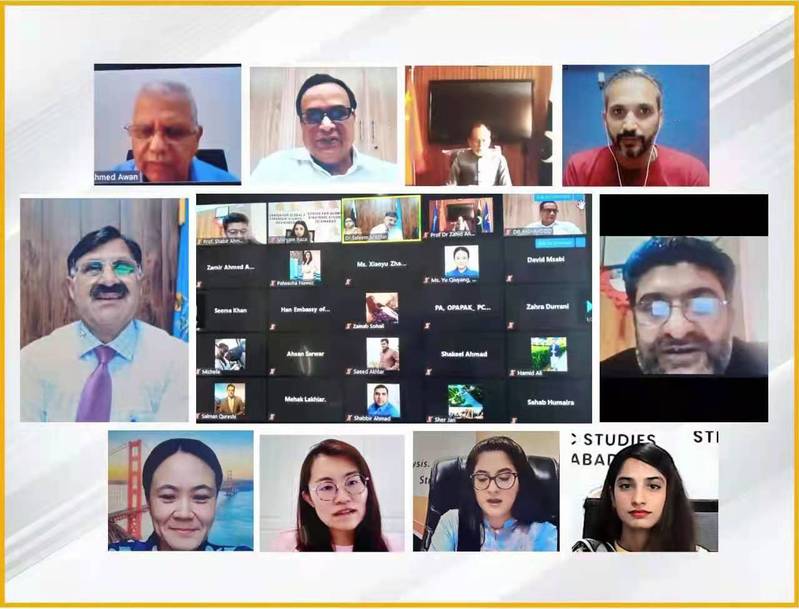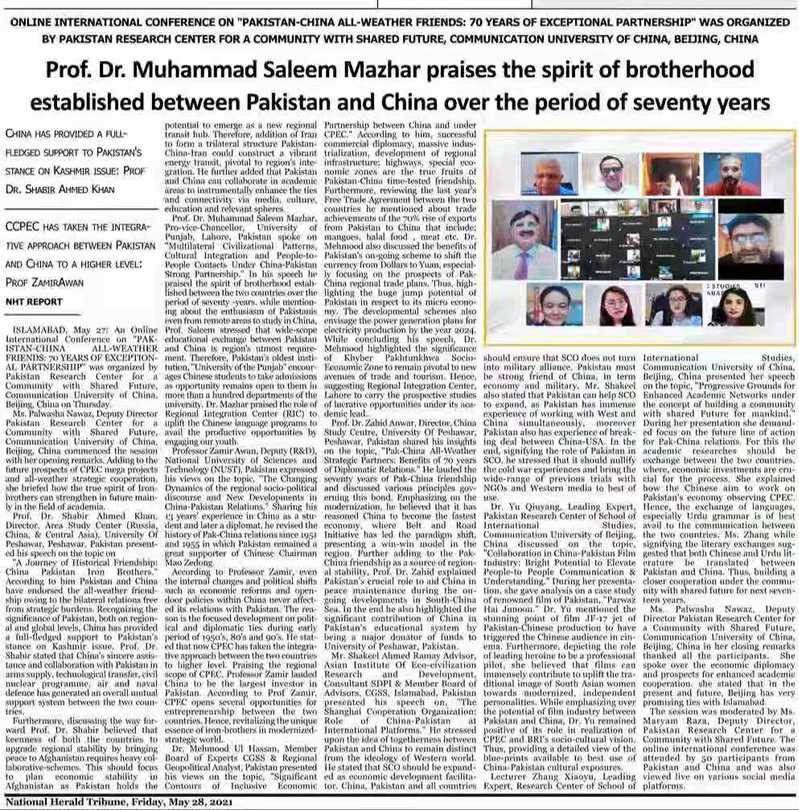Online International Conference on PAKISTAN-CHINA ALL-WEATHERS FRIENDS: 70 YEARS OF EXCEPTIONAL PARTNERSHIP was organized by Pakistan Research Center for a Community with Shared Future, Communication University of China, Beijing, China

On 27th May 2021, an Online International Conference on PAKISTAN-CHINA ALL-WEATHERS FRIENDS: 70 YEARS OF EXCEPTIONAL PARTNERSHIP was organized by Pakistan Research Center for a Community with Shared Future, Communication University of China, Beijing, China.

Ms. Palwasha Nawaz, Deputy Director Pakistan Research Center for a Community with Shared Future, Communication University of China, Beijing, China commenced the session with her opening remarks. Adding to the future prospects of CPEC mega projects and all-weather strategic cooperation, she briefed how the true spirit of Iron-brothers can strengthen in future mainly in the field of academia.
Prof. Dr. Shabir Ahmed Khan, Director, Area Study Center (Russia, China, & Central Asia), University Of Peshawar, Peshawar, Pakistan presented his speech on the topic on
“A Journey of Historical Friendship: China Pakistan Iron Brothers.”According to him Pakistan and China have endorsed the all-weather friendship owing to the bilateral relations free from strategic burdens. Recognizing the significance of Pakistan, both on regional and global levels, China has provided a full-fledged support to Pakistan’s stance on Kashmir issue. Prof. Dr. Shabir stated that China’s sincere assistance and collaboration with Pakistan in arms supply, technological transfer, civil nuclear program, air and naval defense has generated an overall mutual support system between the two countries.
Furthermore, discussing the way forward Prof. Dr. Shabir believed that keenness of both the countries to upgrade regional stability by bringing peace to Afghanistan requires heavy collaborative-schemes. This should focus to plan economic stability in Afghanistan as Pakistan holds the potential to emerge as a new regional transit hub. Therefore, addition of Iran to form a trilateral structure Pakistan-China-Iran could construct a vibrant energy transit, pivotal to region’s integration. He further added that Pakistan and China can collaborate in academic areas to instrumentally enhance the ties and connectivity via media, culture, education and relevant spheres.
Prof. Dr. Muhammad Saleem Mazhar, Pro-vice-Chancellor, University of Punjab, Lahore, Pakistan spoke on “Multilateral Civilizational Patterns, Cultural Integration and People-to-People Contacts Under China-Pakistan Strong Partnership.” In his speech he praised the spirit of brotherhood established between the two countries over the period of seventy –years. while mentioning about the enthusiasm of Pakistanis even from remote areas to study in China, Prof. Saleem stressed that wide-scope educational exchange between Pakistan and China is region’s utmost requirement. Therefore, Pakistan’s oldest institution, “University of the Punjab” encourages Chinese students to take admissions as opportunity remains open to them in more than a hundred departments of the university. Dr. Mazhar praised the role of Regional Integration Center (RIC) to uplift the Chinese language programs to avail the productive opportunities by engaging our youth.
Professor Zamir Awan, Deputy (R&D), National University of Sciences and Technology (NUST), Pakistanexpressed his views on the topic, “The Changing Dynamics of the regional socio-political discourse and New Developments in China-Pakistan Relations.” Sharing his 13 years’ experience in China as a student and later a diplomat, he revised the history of Pak-China relations since 1951 and 1955 in which Pakistan remained a great supporter of Chinese Chairman Mao Zedong.
According to Professor Zamir, even the internal changes and political shifts such as economic reforms and open-door policies within China never affected its relations with Pakistan. The reason is the focused development on political and diplomatic ties during early period of 1950’s, 80’s and 90’s. He stated that now CPEC has taken the integrative approach between the two countries to higher level. Praising the regional scope of CPEC, Professor Zamir lauded China to be the largest investor in Pakistan. According to Dr. Mazhar, CPEC opens several opportunities for entrepreneurship between two countries. Hence, revitalizing the unique essence of iron-brothers in modernized-strategic world.
Dr. Mehmood Ul Hassan, Member Board of Experts CGSS & Regional Geopolitical Analyst, Pakistan presented his views on the topic, “Significant Contours of Inclusive Economic Partnership between China and under CPEC.” According to him, successful commercial diplomacy, massive industrialization, development of regional infrastructure; highways, special economic zones are the true fruits of Pakistan-China time-tested friendship. Furthermore, reviewing the last year’s Free Trade Agreement between the two countries he mentioned about trade achievements of the 70% rise of exports from Pakistan to China that include; mangoes, halal food , meat etc. Dr. Mehmood also discussed the benefits of Pakistan’s on-going scheme to shift the currency from Dollars to Yuan, especially focusing on the prospects of Pak-China regional trade plans. Thus, highlighting the huge jump potential of Pakistan in respect to its micro economy. The developmental schemes also envisage the power generation plans for electricity production by the year 2024. While concluding his speech, Dr. Mehmood highlighted the significance of Khyber Pakhtunkhwa Socio-Economic Zone to remain pivotal to new avenues of trade and tourism. Hence, suggesting Regional Integration Center, Lahore to carry the prospective studies of lucrative opportunities under its academic lead.
Prof. Dr. Zahid Anwar, Director, China Study Centre, University Of Peshawar, Peshawar, Pakistan shared his insights on the topic, “Pak-China All-Weather Strategic Partners: Benefits of 70 years of Diplomatic Relations.” He lauded the seventy years of Pak-China friendship and discussed various principles governing this bond. Emphasizing on the modernization, he believed that it has reasoned China to become the fastest economy, where Belt and Road Initiative has led the paradigm shift, presenting a win-win model in the region. Further adding to the Pak-China friendship as a source of regional stability, Prof. Dr. Zahid explained Pakistan’s crucial role to aid China in peace maintenance during the on-going developments in South-China Sea. In the end he also highlighted the significant contribution of China in Pakistan’s educational system by being a major donator of funds to University of Peshawar, Pakistan.
Mr. Shakeel Ahmed Ramay Advisor, Asian Institute Of Eco-civilization Research and Development, Consultant SDPI & Member Board of Advisors, CGSS, Islamabad, Pakistan presented his speech on, “The Shanghai Cooperation Organization: Role of China-Pakistan at International Platforms.” He stressed upon the idea of togetherness between Pakistan and China to remain distinct from the ideology of Western world. He stated that SCO should be expanded as economic development facilitator. China, Pakistan and all countries should ensure that SCO does not turn into military alliance. Pakistan must be strong friend of China, in term economy and military. Mr. Shakeel also stated that Pakistan can help SCO to expand, as Pakistan has immense experience of working with West and China simultaneously, moreover Pakistan also has experience of breaking deal between China-USA. In the end, signifying the role of Pakistan in SCO, he stressed that it should nullify the cold war experiences and bring the wide-range of previous trials with NGOs and Western media to best of use.
Dr. Yu Qiuyang, Leading Expert, Pakistan Research Center of School of International Studies, Communication University of Beijing, China discussed on the topic, “Collaboration in China-Pakistan Film Industry: Bright Potential to Elevate People-to People Communication & Understanding.” During her presentation, she gave analysis on a case study of renowned film of Pakistan, “Parwaz Hai Junoon.” Dr. Yu mentioned the stunning point of film JF-17 jet of Pakistan-Chinese production to have triggered the Chinese audience in cinema. Furthermore, depicting the role of leading heroine to be a professional pilot, she believed that films can immensely contribute to uplift the traditional image of South Asian women towards modernized, independent personalities. While emphasizing over the potential of film industry between Pakistan and China, Dr. Yu remained positive of its role in realization of CPEC and BRI’s socio-cultural vision. Thus, providing a detailed view of the blue-prints available to best use of China-Pakistan cultural exposures.
Lecturer Zhang Xiaoyu, Leading Expert, Research Center of School of International Studies, Communication University of China, Beijing, China presented her speech on the topic, “Progressive Grounds for Enhanced Academic Networks under the concept of building a community with shared Future for mankind.” During her presentation she demanded focus on the future line of action for Pak-China relations. For this the academic researches should be exchange between the two countries, where, economic investments are crucial for the process. She explained how the Chinese aim to work on Pakistan’s economy observing CPEC. Hence, the exchange of languages, especially Urdu grammar is of best avail to the communication between the two countries. Ms. Zhang while signifying the literary exchanges suggested that both Chinese and Urdu literature be translated between Pakistan and China. Thus, building a closer cooperation under the community with shared future for next seventeen years.
Ms. Palwasha Nawaz, Deputy Director Pakistan Research Center for a Community with Shared Future, Communication University of China, Beijing, China in her closing remarks thanked all the participants. She spoke over the economic diplomacy and prospects for enhanced academic cooperation. she stated that in the present and future, Beijing has very promising ties with Islamabad.
The session was moderated by Ms. Maryam Raza, Deputy Director, Pakistan Research Center for a Community with Shared Future. The online international conference was attended by 50 participants from Pakistan and China and was also viewed live on various social media platforms.
Originally published on National Herald:
https://www.dailynht.com/epaper/main.php?action=epaper&id=main&page=4&dt=28-05-2021

